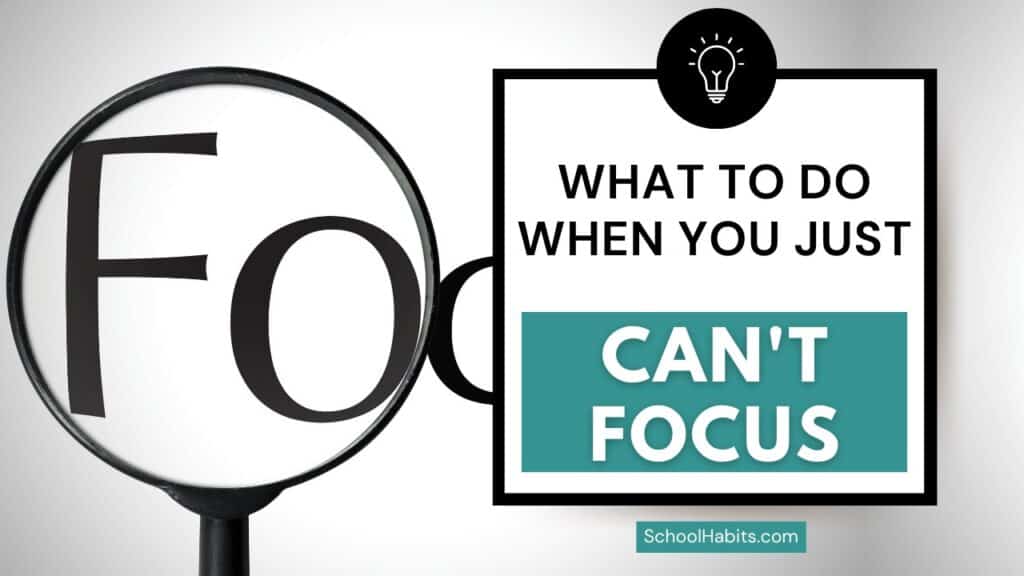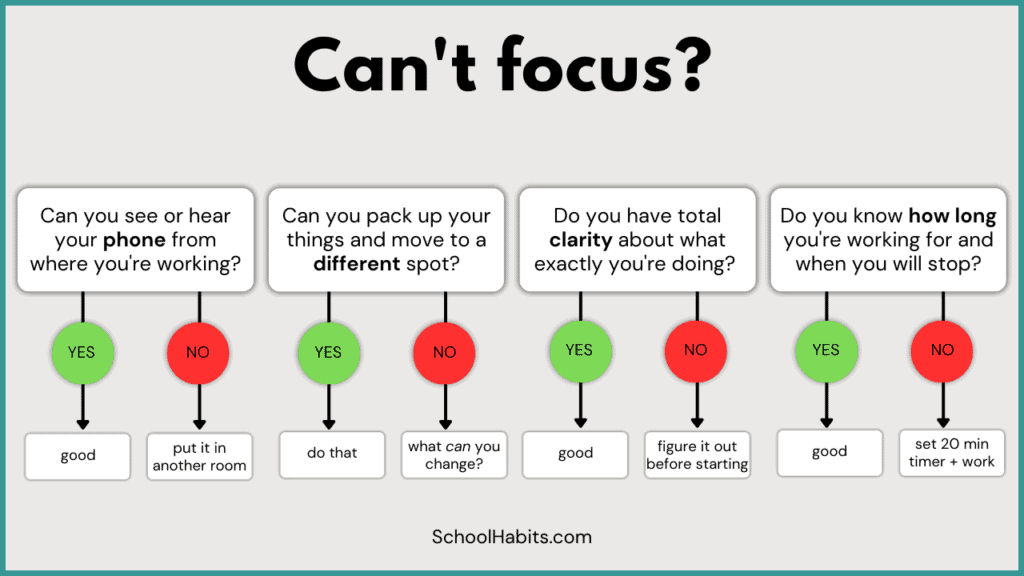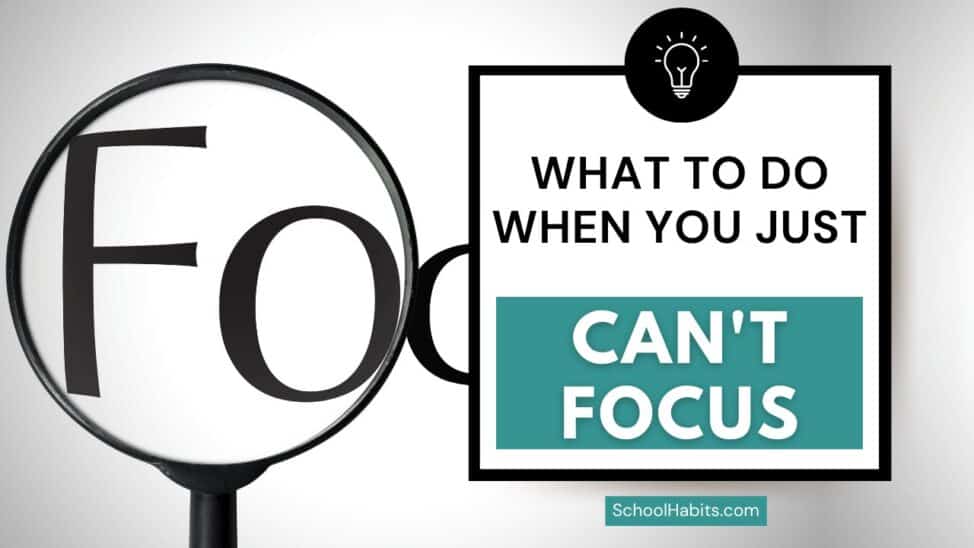
By Katie Azevedo, M.Ed.
The ability to focus is at the core of nearly everything you’re asked to do in school. You can’t read a book if you can’t focus. You can’t follow along with a science lecture if you can’t focus. You can’t solve a math problem if you can’t focus. Heck, you can’t write more than a few sentences if you can’t focus.
In other words, being unable to focus is no joke, and can lead to so many other issues. This blog post contains four tips for what to do when you just can’t focus on what needs to get done.
ADHD and focus
In this blog post and this video, I cover the two main reasons why you can’t focus. I cover ADHD in those two resources too (of course), but a quick word about ADHD and focus: neurologically, ADHD directly impacts sustained concentration.
The four tips I share below will by no means outweigh the negative effects of ADHD of focus. If you have ADHD, the tips I’m sharing are even more important because you’re starting at a disadvantage. Make sense?
What to do when you just can’t focus
Your essay is due tomorrow. You have to read 11 chapters in Moby Dick by the morning. You have to study for two tests tonight and it’s already 10 PM. But you just can’t focus! You’re trying, but … your brain is just … somewhere else. What do you do? Try the following tips.
1. Get rid of the phone – for real.
I debated starting the list with this tip because I was afraid you’d roll your eyes and leave. (If you’re still here, you’re the best.) I am dead serious about getting rid of your phone when you’re trying to focus. It’s really one or the other: you either have your phone with you, or you focus on what you’re doing. We can’t have both and it’s time we stop pretending we can.
Your phone is one of the strongest emotional triggers in your entire environment. It’s the source of endless information, distractions, potential emergencies, and “urgent” notifications. If we were to go back in time, your phone is the equivalent of a dark cave, and your Neanderthal brain would be unable to think of anything except for what’s in that cave? It’s a matter of survival, really.
If you’re having a hard time focusing, you must remove your phone from your workspace. No exceptions. Keeping it upside down on the table next to you is not enough, because the visual trigger is still there. Zip it inside a pocket inside a backpack, or put it in another room altogether.
2. Go somewhere totally different.
Novelty, which means newness, is a primary factor in motivation. The more motivation you feel toward a task, the better you’ll be able to focus on it. The next time you just can’t focus, pack up your things and go somewhere different. This might mean you move from your bedroom to the kitchen table. Or maybe you move from your dorm room to your campus library.
Changing your physical environment isn’t practical all the time. But, it’s an excellent strategy when you’re working on cognitively demanding tasks and just can’t focus.
3. Have total clarity before starting.
If you don’t have total clarity about what you’re supposed to be doing, you won’t be able to focus. When we are unclear about a task, procrastination kicks in hardcore. That’s because we perceive unclear things as hard things, and we emotionally run from both.
To improve your focus, get clear on exactly what you’re doing before you sit down to do it. For example, instead of saying “I’m going to study,” you’d say “I’ll make flashcards for all the vocab in Chapter 17.” Instead of saying “I’m going to read for English,” you’d say “I’ll read until the end of chapter 9.” Be specific.
If you’re confused about what you’re supposed to do, be honest about that before sitting down to “fake do” it. Ask your teacher, ask a classmate, read the assignment again, check your notes, or use any of these How to Figure Things Out strategies.

4. Have a clear starting and stopping point.
The final tip for what to do when you just can’t focus is to determine a starting time and stopping time before sitting down to work. When you know how long you are going to work on something, the task won’t seem so endless. This can help improve your focus.
On the other hand, if you don’t have a clear stopping point, there’s no urgency. Psychologically, when we don’t perceive urgency (the sense that time is limited and running out), we work slower and with less focus and intention. According to something called Parkinson’s Law, which was originally published in this Economist article (the original article is behind a pay wall, but if you Google “Parkinson’s Law,” you’ll see plenty of other sources), “work expands so as to fill the time available for its completion.” Said a different way, if we give ourselves 60 minutes to write an email, it will take 60 minutes. But if we give ourselves 15 minutes to write the same email, it will only take 15 minutes.
Here’s what you can do: For simple tasks that you’re struggling to focus on, set the timer for anywhere between 15 and 30 minutes. Pump yourself up to work on the task until the timer goes off. If you feel the urge to check your phone (which should be in another room, yes?), don’t do it. Stay in your chair and do the work. When the timer goes off, get and take a break.
If you’re working on something challenging that will require more than 15-30 minutes to complete, use this Google Calendar strategy to identify exactly where in your day or week you have pockets of time to work on the task or project. Find specific starting and stopping points to work, and write those down or put them in your calendar. For example, the goal is to have a plan that’s as specific as I’ll work on my Psychology essay on Monday from 1:00-1:45, and Wednesday from 12:00-1:00 and 4:00-4:30.
More of my top resources and tips to improve your focus:
- How to avoid distractions while studying: 7 tips for better focus
- How to stay focused while reading
- How to stay focused in class: 7 tricks to avoid zoning out
- How to stay focused in a boring class

